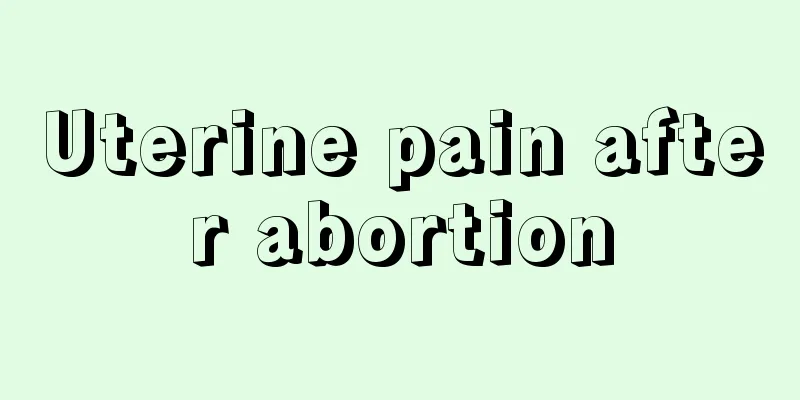Irregular menstruation after childbirth

|
Due to changes in hormones in the body after pregnancy, menstruation may not come. After the body gradually recovers after delivery, menstruation will become normal. Some people are in the breastfeeding period right after giving birth, and their bodies have not fully recovered, so their menstruation will come later. Most women will have irregular menstruation after childbirth, and it will generally become normal after the body has fully recovered. If irregular menstruation occurs for a long time, it is best to go to the hospital for a detailed examination. Generally, after childbirth, irregular menstruation may occur due to changes in hormone levels in women. Some are menstrual cycle disorders, which are mostly related to the fact that the ovarian function has not yet fully recovered. It takes about two to three months for the menstrual cycle to return to normal; some are abnormal menstrual flow, either less or more. Everyone should know these menstrual knowledge after giving birth. Some are menstrual cycle disorders, which are mostly related to the fact that the ovarian function has not yet fully recovered. It takes about two to three months for the menstrual cycle to return to normal; some are abnormal menstrual flow, either less or more. The normal menstrual blood volume for women is generally 50~80ml, with the heaviest bleeding on the 2nd-3rd day of menstruation. If the daily blood loss is more than 80ml, or the menstrual volume is significantly increased than before, it is excessive menstrual flow. There are many reasons for heavy menstrual flow. For example, for mothers who breastfeed after childbirth, breastfeeding increases the level of prolactin in the body and inhibits ovulation, which makes the menstruation come later and the first menstrual flow will be heavier. In addition to normal factors that cause increased menstrual flow for the first time after childbirth, other reasons should also be considered: Is there any placenta residue during delivery? Is the postpartum uterine recovery poor? Is the uterine wound healing poor after cesarean section? Some gynecological diseases may also cause heavy menstrual flow, such as uterine fibroids, uterine polyps, etc. Systemic diseases and mental factors can also cause heavy menstrual flow. : In fact, we don’t need to worry about whether our period comes early or late. There are great individual differences in the resumption of menstruation after childbirth. Some mothers welcome their "old friend" one month after delivery, while some mothers take one year after delivery to resume normal menstruation. Generally speaking, the visit of "old friends" after childbirth is related to whether the mother breastfeeds, the length of breastfeeding, the mother's age and the recovery of ovarian function. If you breastfeed regularly and your period does not come, this is normal; for mothers who do not breastfeed, "old friend" will usually come within 6-8 weeks after delivery. If you are not breastfeeding and your period has not come for more than 3 months, it is best to go to the obstetrics and gynecology department for a check-up. Regardless of whether or not a mother is breastfeeding, her menstrual cycle is usually irregular during the first few periods after delivery, but it will generally return to normal after a few times. Irregular menstruation after childbirth is normal. It does not represent the body's recovery. Coming early is not necessarily good, and coming late is not necessarily good. It mainly depends on the original physical condition, the situation of the confinement period, and how you usually take care of the baby. However, if the postpartum menstrual cycle is disrupted for a long time, you must consult a gynecologist, because it may also be caused by neuroendocrine dysfunction, organic diseases or drugs. In general, in order to avoid abnormal menstruation after childbirth, new mothers should pay attention to the maintenance and recovery of their bodies after childbirth, and take care of themselves according to their actual conditions. |
<<: What to eat after cesarean section
>>: Will red stretch marks disappear after giving birth?
Recommend
Exploring the "warning signs" of kidney disease, an article explains
1. Edema Edema is one of the common symptoms of k...
How long is the ovulation period?
If the ovulation period can be correctly grasped,...
Counterpoint Research: Global smartphone revenue fell 8% year-on-year in Q2 2023, and Apple earned 85% of global smartphone profits
Apple earns 85% of the world's smartphone pro...
Can I take Fenbid during breastfeeding?
We all hope to have a healthy body and a happy fa...
Why do I have breast pain before my period?
Many women experience breast pain before each men...
Symptoms of Mirena ring migration
Mirena is a contraceptive ring that can have a co...
Warm uterus pregnancy pills
There are many types of medicines, and you cannot...
Abdominal pain and amenorrhea
Some female friends often feel pain in their lowe...
Will chickenpox during pregnancy affect the baby?
Varicella is a viral infection. Although most pat...
What to do if your face peels after pregnancy
A woman’s pregnancy is a big event for the whole ...
Mashable: Data explains iOS's "weight gain" process
As the iOS system becomes more and more powerful,...
Generally, how long does it take to get pregnant quickly after removing the IUD?
Everyone knows that after removing the IUD, it is...
What medicine can make menstruation come?
If a woman has amenorrhea, it is most likely that...
2023 Medical Science Popularization - Gallbladder Polyps
Gallbladder polyps are bulge-like lesions that or...
Why does my lower abdomen hurt when I press it during ovulation?
Because the causes of abdominal pain vary greatly...









